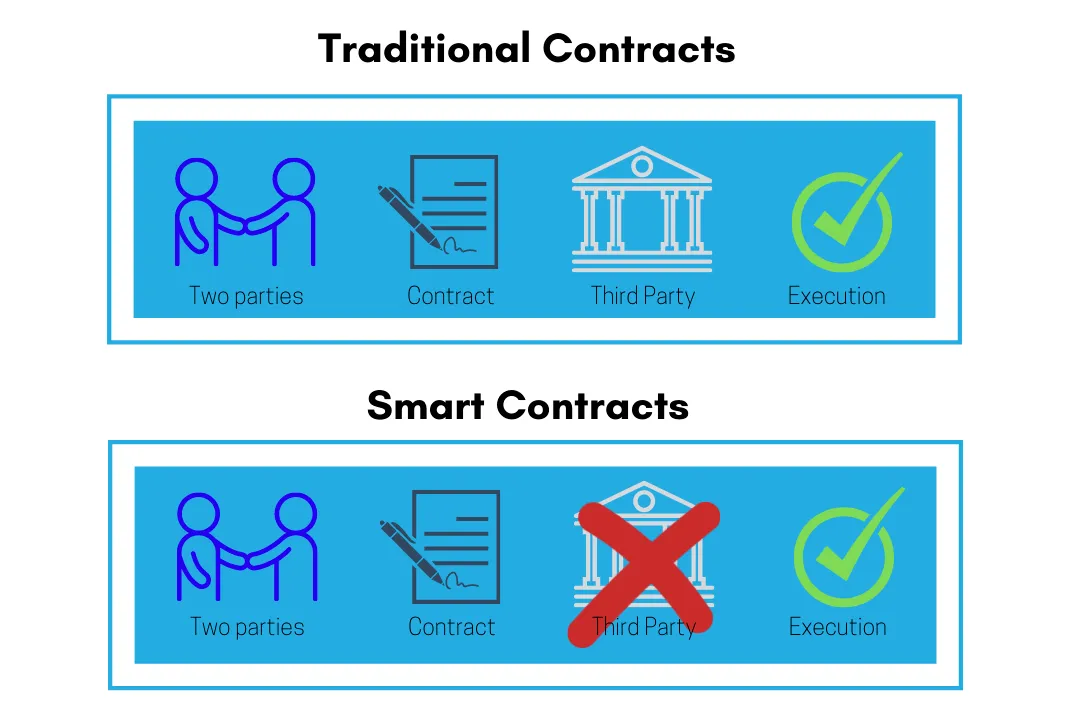What is a Smart Contract? How Smart Contracts work

If Bitcoin is the dawn of crypto, smart contracts are the crypto revolution. Thanks to smart contracts, applications evolved to be decentralized in the form of decentralized applications (DApps). Let’s find out what is a smart contract, how it works, and its impact on the future.
What is a Smart Contract?
A smart contract is written in the programming language to conduct a set of instructions on the blockchain. In addition, it can run without any intermediary. Smart contracts are the revolutionary innovation of blockchain technology that brings up the advent of decentralized applications (Dapps).

The biggest difference between traditional contracts and smart ones is that smart contracts eliminate third-party involvement. At the moment, we interact with smart contracts in our daily usage in the crypto space.
Dapps are comprised of one or numerous bundled smart contracts. Countless Dapps are built to natively run on blockchain platforms. Some of them make their way to the top in terms of total revenue.
Ethereum is the first blockchain platform to enable smart contracts. An ecosystem of Dapps inside Ethereum captures lots of value to the blockchain.
The term smart contract was forged by Nick Szabo in his paper published in 1994. Many cryptographic techniques were invented at that time, gearing toward a truthless and decentralized world. The notion of smart contracts is the beginning of many blockchain advancements.
How does Smart Contract work?
Components of a smart contract
Let’s break down the basic components of a smart contract:
Code: Inside a smart contract, it is 100% code. Developers write basic to complex instructions such as if-then or call functions. Developers write code and then deploy it onto the blockchain for execution.
Programming languages: Each blockchain platform uses different, sometimes similar, programming languages for smart contract writing. Developers use Solidity to write code running on EVM blockchains. Other than Solidity, non-EVM blockchains use programming languages like Rust, C/C++, Javascript, and Haskell/Plutus to write smart contracts.
Oracles: This is an indispensable part of DeFi. How can smart contracts know when any condition is met? Oracles are responsible for providing reliable data feeds to smart contracts of DeFi protocols.
Smart contracts on Ethereum
Each blockchain has a different way of deploying smart contracts. For example, Ethereum allows developers to deploy a smart contract as an Ethereum account that has a balance and is able to send irreversible transactions. Every user can interact with smart contracts on Ethereum.
Solidity and Vyper are the two programming languages for smart contracts on Ethereum. EVM (Ethereum Virtual Machine) is responsible for compiling the code. After being deployed on the blockchain, a smart contract will have a unique contract address.
Features of Smart Contracts
Limitless applications: We can write anything in traditional contracts that can come to mutual agreements between two or more parties. So do smart contracts; we can write detailed instructions in the form of code to maneuver what it can do. Therefore, smart contracts are capable of creating limitless applications, similar way to how coding has changed the world.
Running without middleman needed: Smart contracts make use of blockchain technology to verify each code execution. There is no third party needed in the process to execute the code. The smart contracts-enabled blockchain will handle the verifying work.
Transparency of smart contracts: We, crypto enthusiasts, can look into each line of codes of smart contracts executed on the blockchain with complete transparency. However, the code might be obscure for the majority of non-technical users. Therefore, there are security companies that focus on auditing the smart contract codes for crypto projects.
Truthless and autonomous: Once deployed, smart contracts can autonomously run accordingly as programmed. Users can interact with the smart contracts of the protocol via the user interface. In addition, two users can trust each other while using smart contracts. This creates an unprecedented and seamless experience with high reliability.
Smart Contract Exploit
It is extremely challenging to write a flawless smart contract. Crypto projects often hire security companies to do formal verifications for their smart contracts. However, not all teams can afford the cost of auditing.
Q1 2022 was a wild time because many exploits and hacks caused investors to lose thousands of millions of dollars in crypto assets. It is a miserable experience to know our funds evaporated over the night.
The infographic shows that hacks and exploits were related to audited projects and unaudited ones. For more information, these security companies are reputable names in this nascent industry. However, this does not mean that projects are immune to attacks.
Auditing companies only do verifications of what they are hired for. Therefore, we should double-check the project showing off to be audited by well-known security companies.
Blockchain is going on its adoption across countries, and so do Dapps. Many governments still shut their doors to crypto-related companies. Thus, if users lose their funds during a hack, they will not be protected by laws. To conclude, we have to be aware of the risks in order to be safe in this new market.
Smart Contract use cases
Since the advent of smart contracts, blockchain technology has been emerging with many new applications that are more market fit. It opens up many new possibilities for implementing blockchain technology. Let’s discover some notable applications of smart contracts.
DeFi Application
- AMM DEX: Crypto natives can swap their crypto/tokens for another by using decentralized exchanges (DEX) like Uniswap, SushiSwap, PancakeSwap, etc. DEX developers write code in smart contracts to implement AMM (Automated Market Maker).
- Stablecoin: Minting and burning decentralized stablecoins such as DAI, FEI, or UST, can be executed via smart contracts. Thus, they can bring stablecoins to interact with Dapps to trade, lend, and borrow.
- Lending/Borrowing: This can leverage the truthless feature of smart contracts. P2P (peer-to-peer) lending can be realized with smart contracts.
- Bridges: To use ETH on Solana, bridges lock ERC20 ETH in smart contracts and mint new ETH (SPL ETH) on Solana. Therefore, users are able to use ETH on Solana. This working principle of crypto bridges is controversially centralized, but it still leverages the use of smart contracts to create an experience similar to cross-chain.
- Other DeFi applications: Derivatives, Synthetic assets, DAO, NFT, NFT marketplace, etc.
Real-life Applications
Beyond applications such as DeFi, smart contracts can bring tons of benefits to the real world via the following use cases such as voting, storage, escrow, supply chain management, etc.
People are good at finding use cases for new innovations like smart contracts. In the future, we will see more applications and the impact of smart contracts on the world.
FAQs about smart contracts
Can Smart Contract solve everything?
The internet has brought to the world unprecedented benefits. Smart contracts can change how some traditional things work, which takes time. In addition, they come as the solutions to many new problems and also bring up new opportunities for innovations.
How does a smart contract hold the fund?
Smart contracts can be developed to hold funds of users if they interact and deposit by using a crypto wallet. The fund can be sent back to the crypto wallet once a programmed date or a specific condition is met. However, the fund in smart contracts can be trapped forever if the code has some flaws.
Can a smart contract be changed?
It is impossible to change smart contracts once they are deployed on the blockchain. Due to the immutable feature of flawed smart contracts of The DAO, a hard fork of the Ethereum network created Ethereum (ETH) and Ethereum Classic (ETC). At the moment, many users decide to stay on Ethereum instead of running to Ethereum Classic.
Conclusion
Smart Contracts have created strong impacts on the crypto space since it is transparent, truthless, autonomous, etc. They are the building blocks of all blockchain-based protocols at the moment. Without smart contracts to build protocols with lines of instructions, the crypto market would only conduct basic transactions among the community.